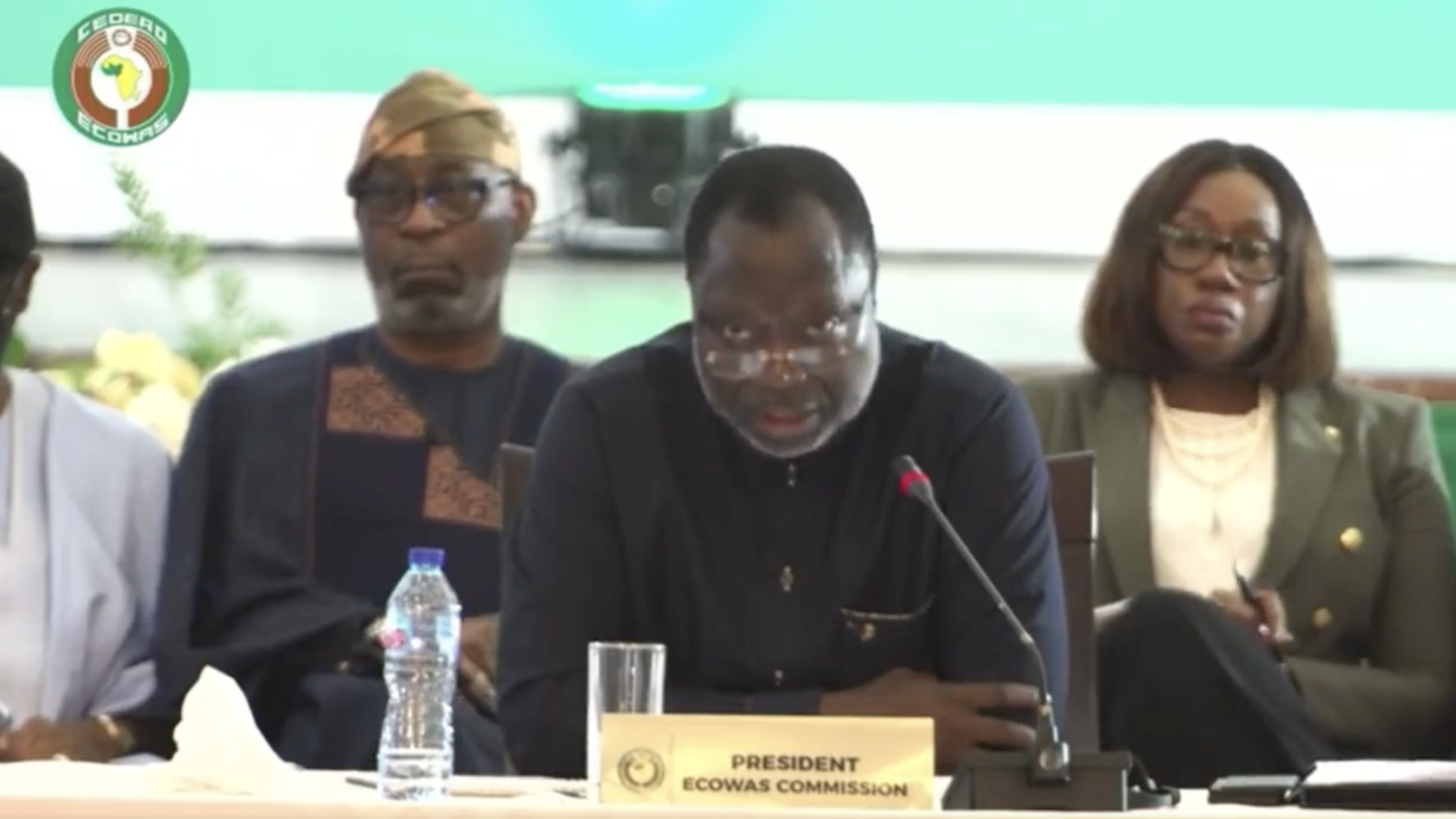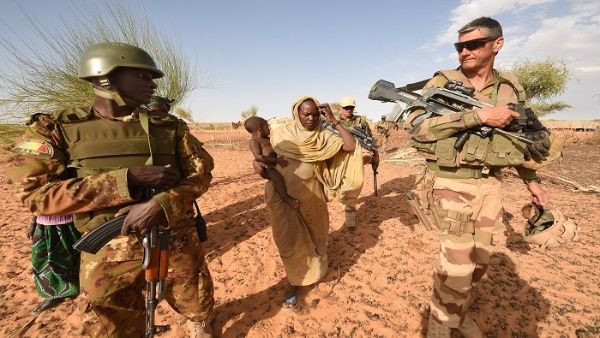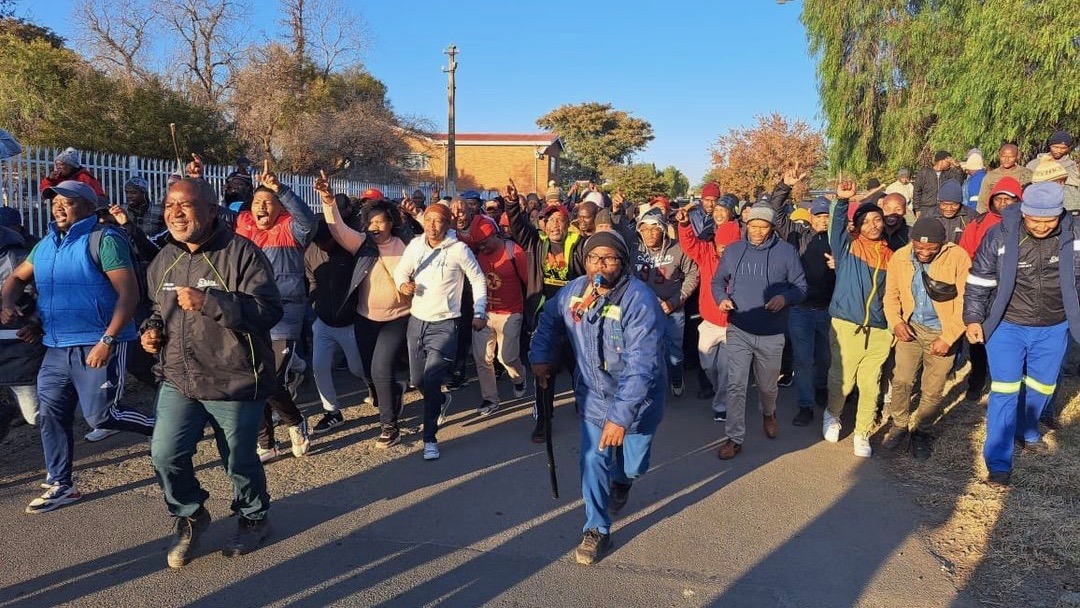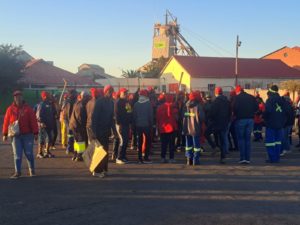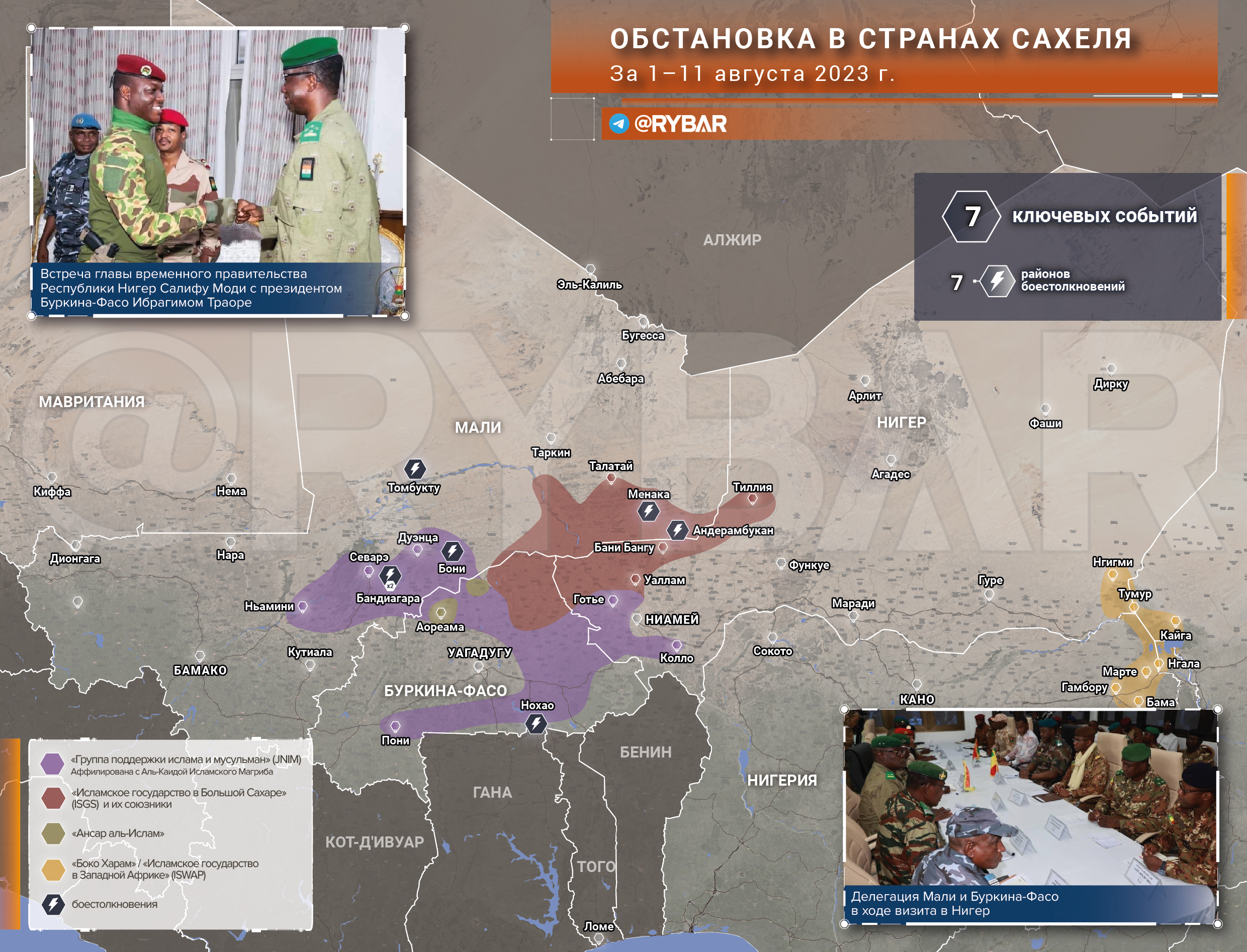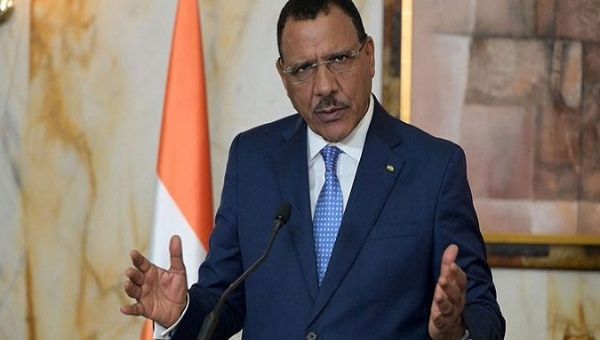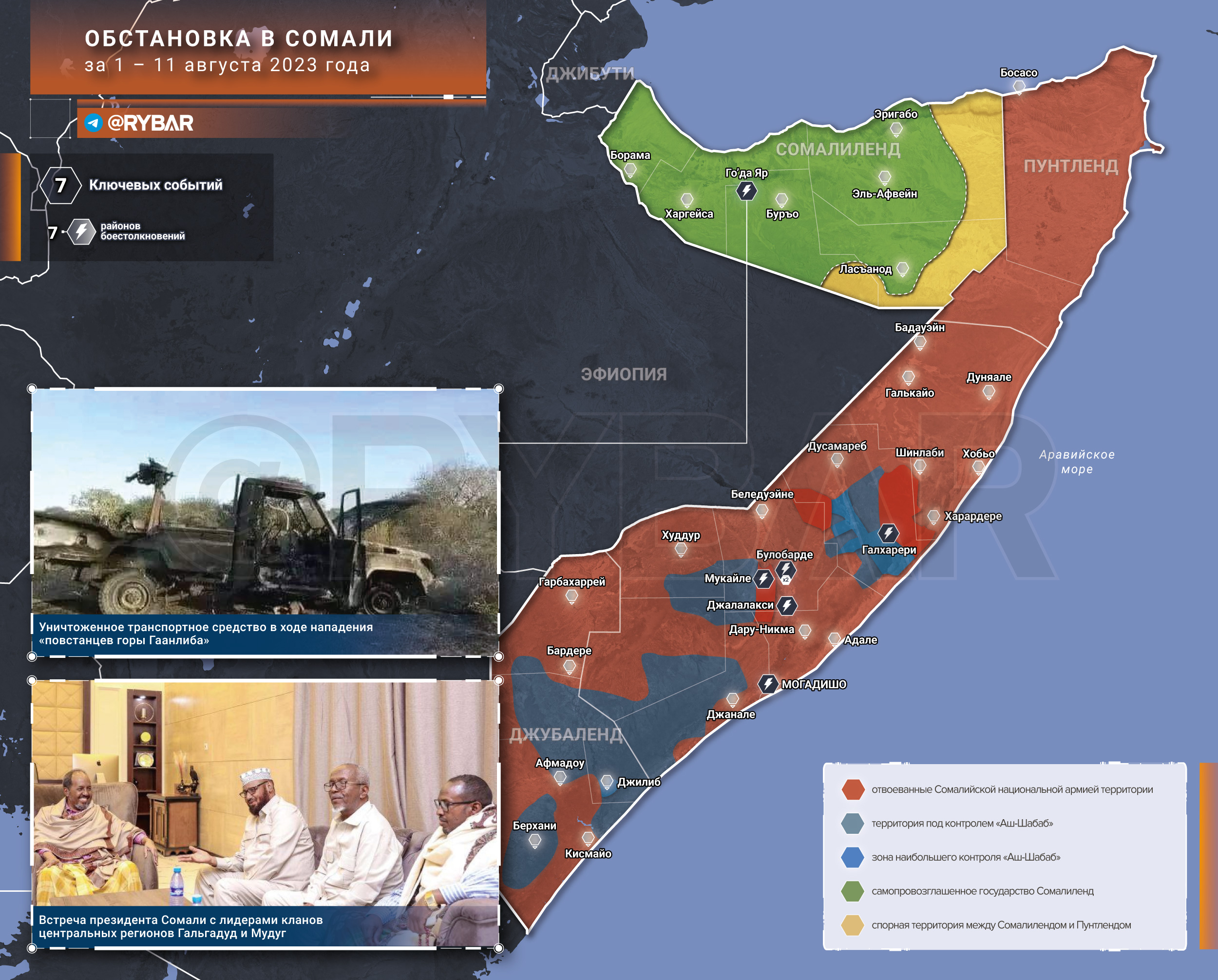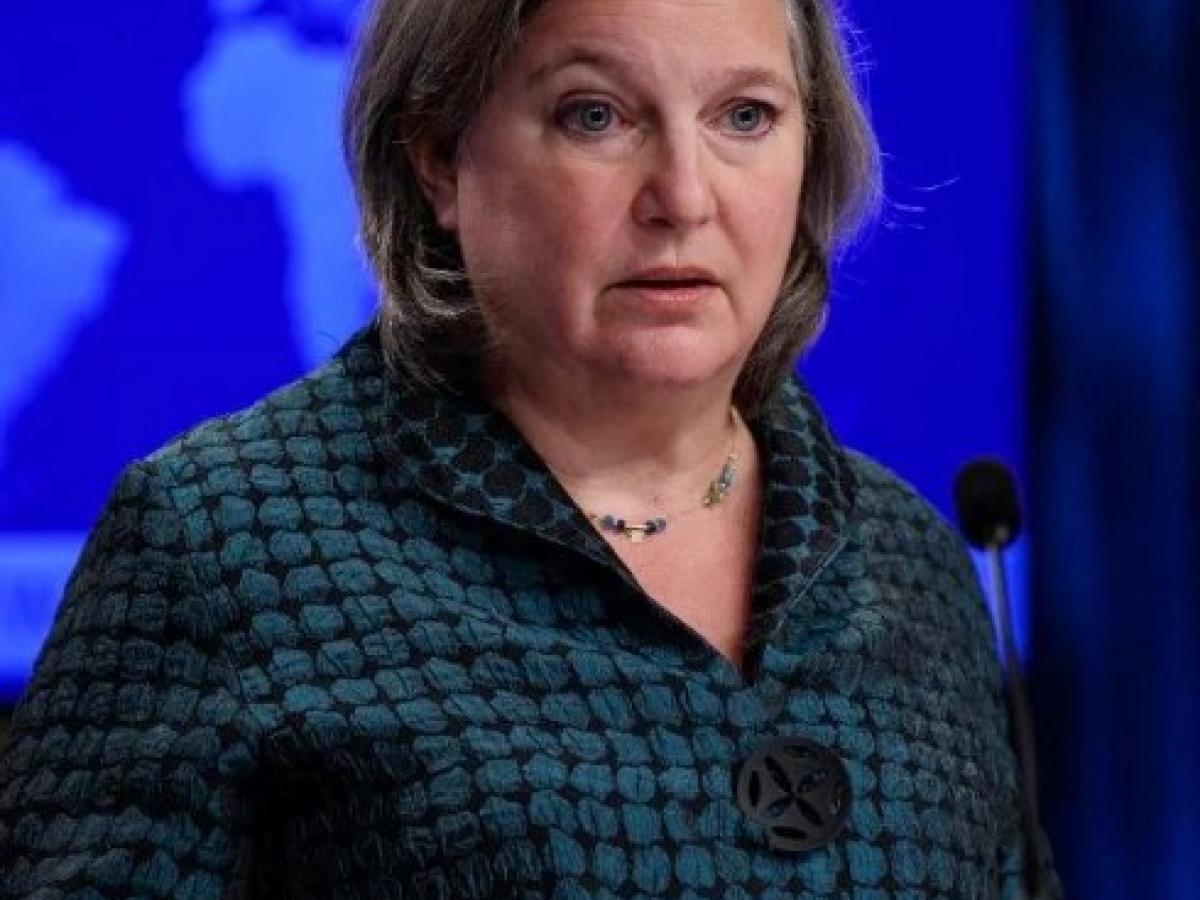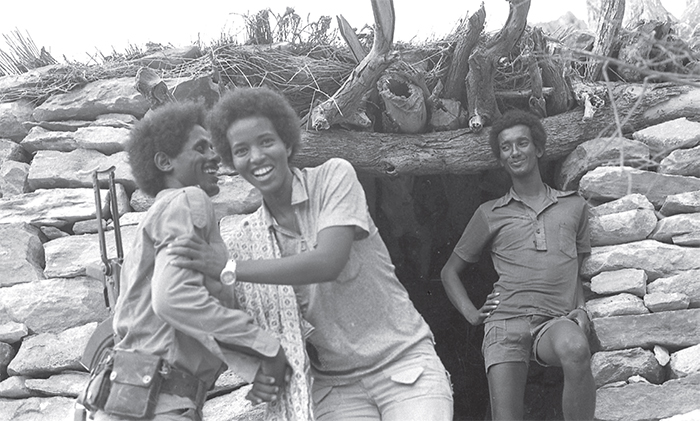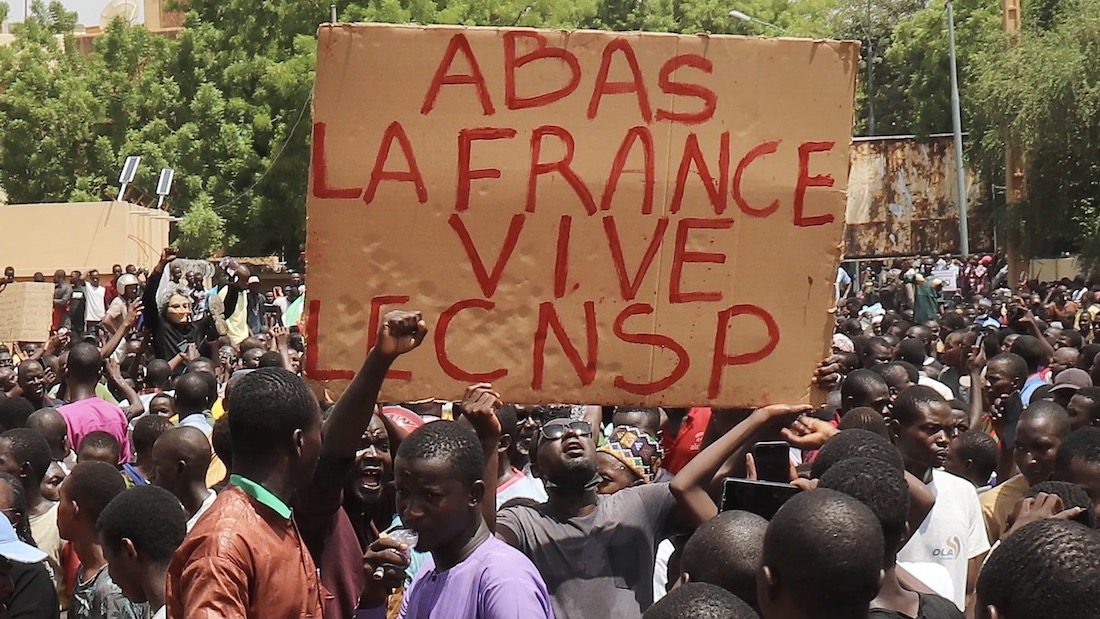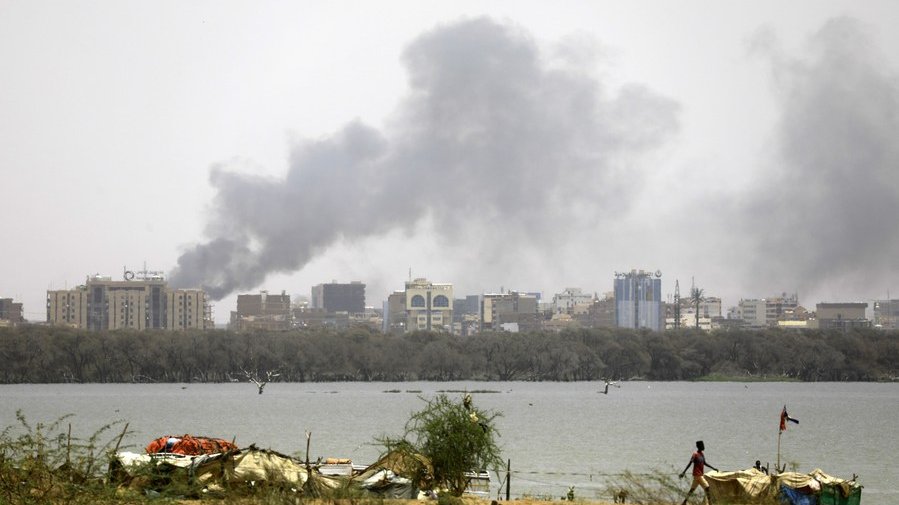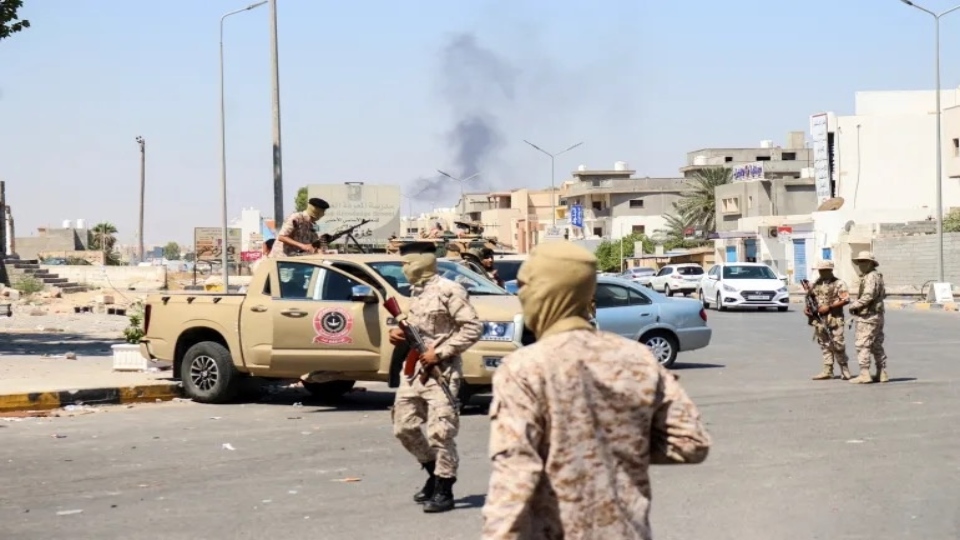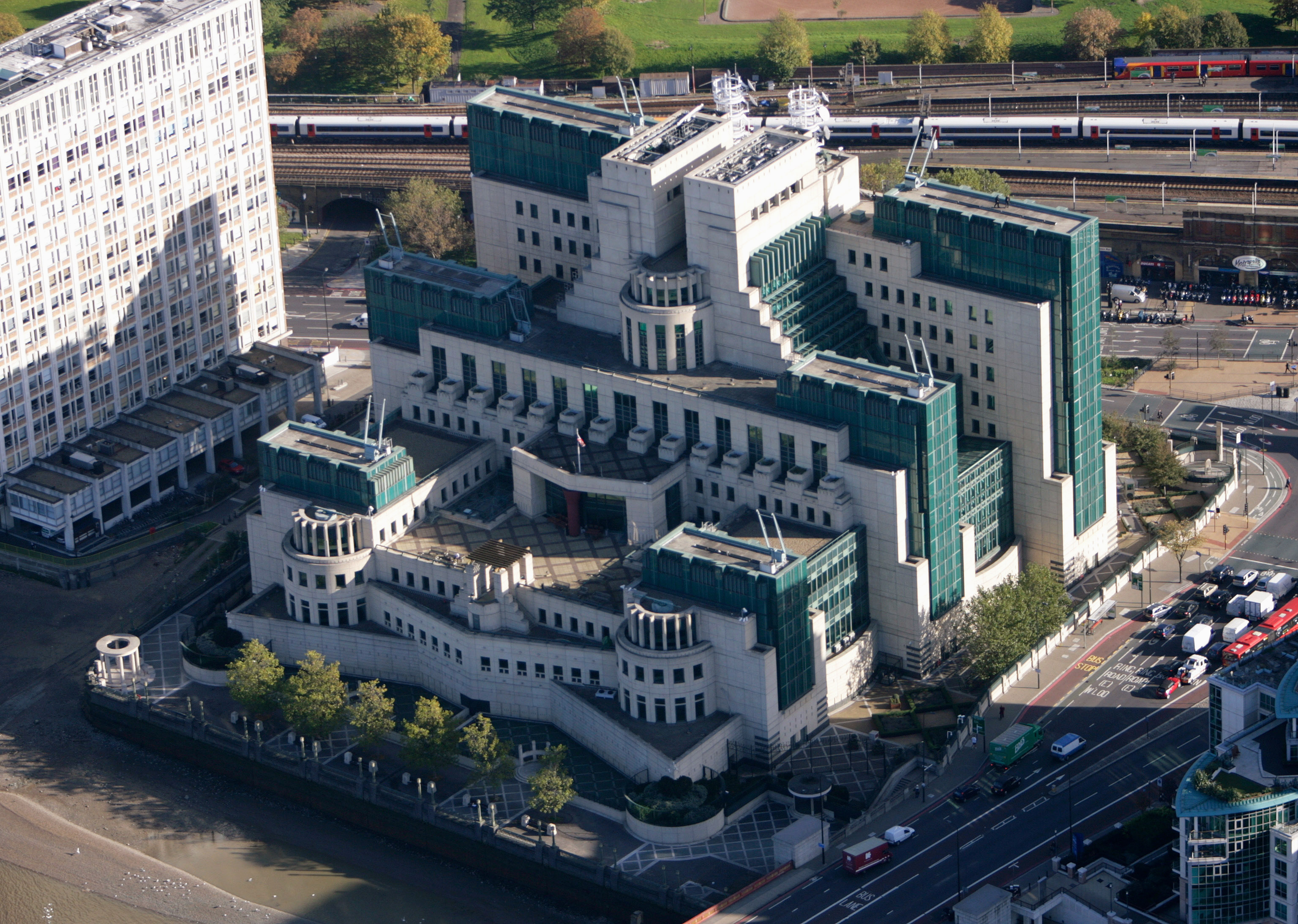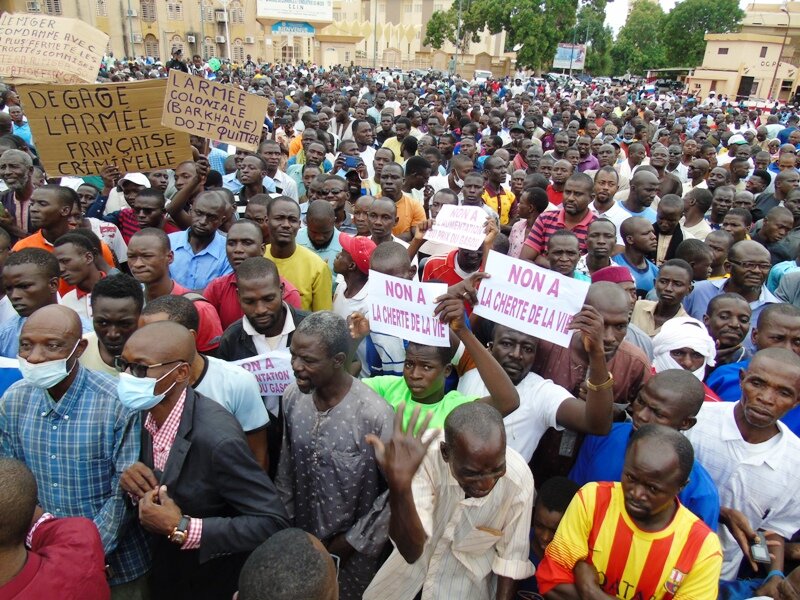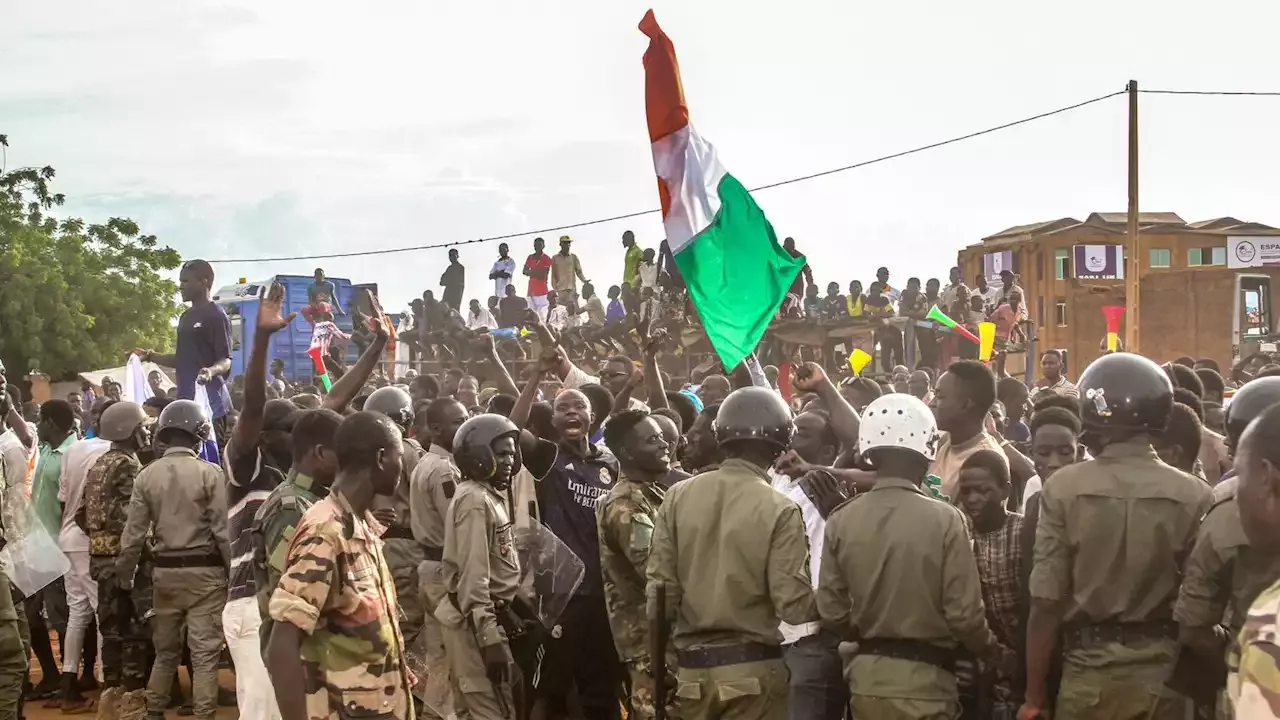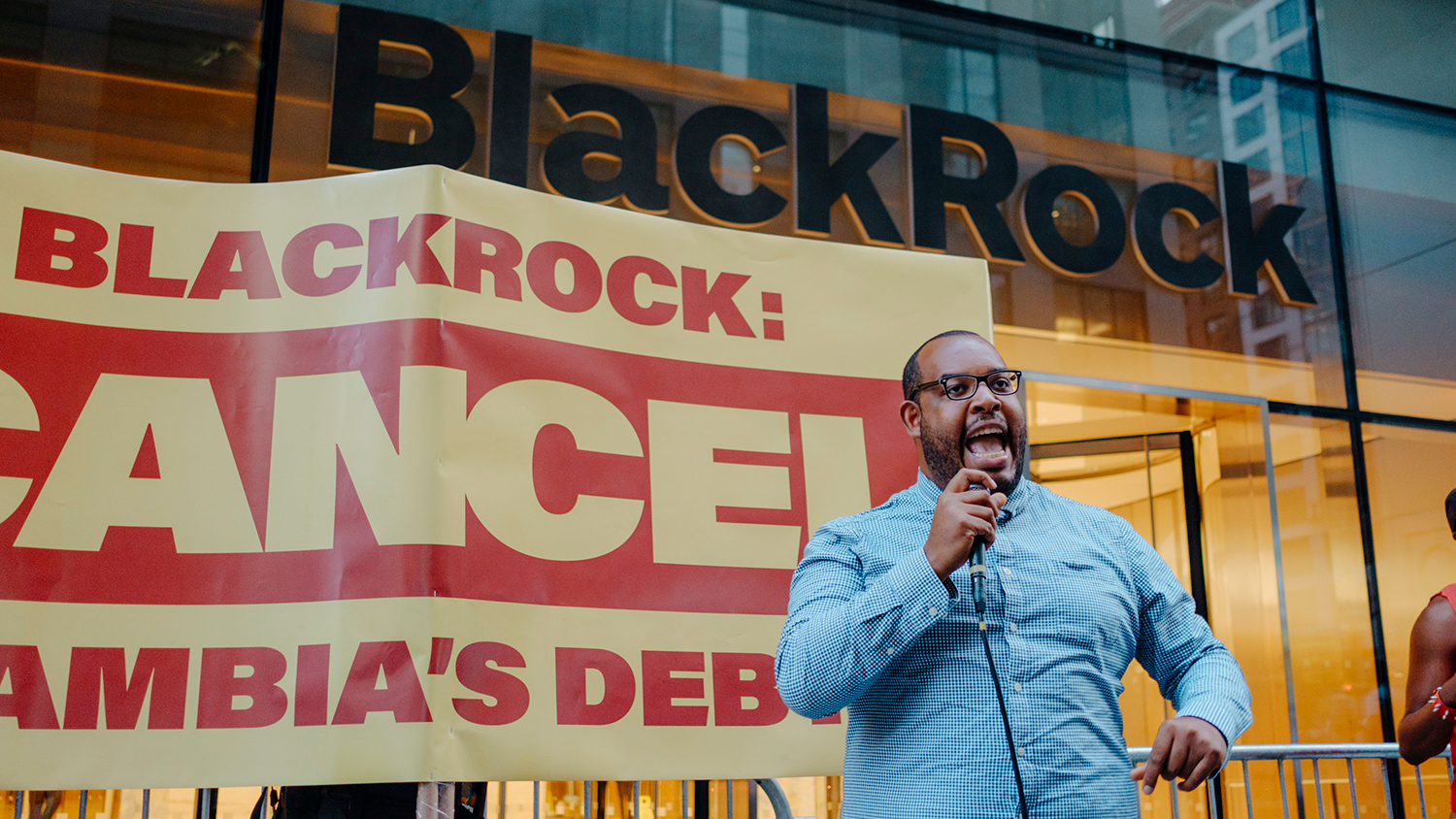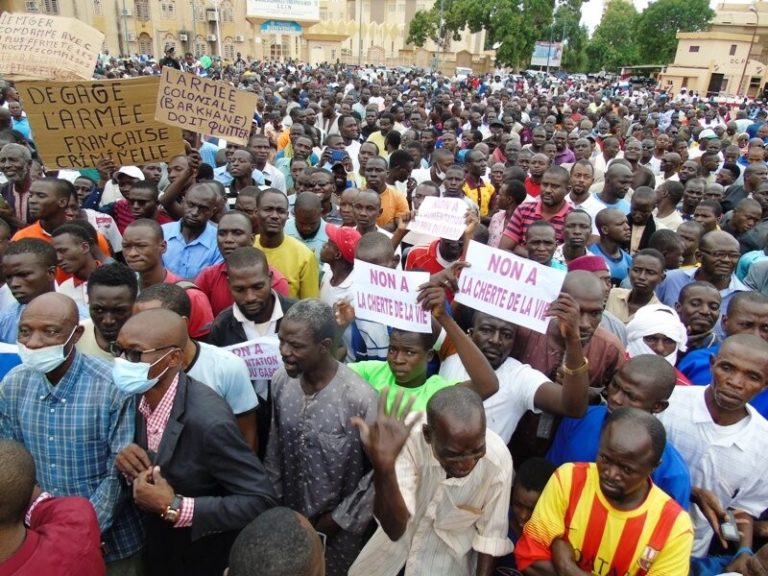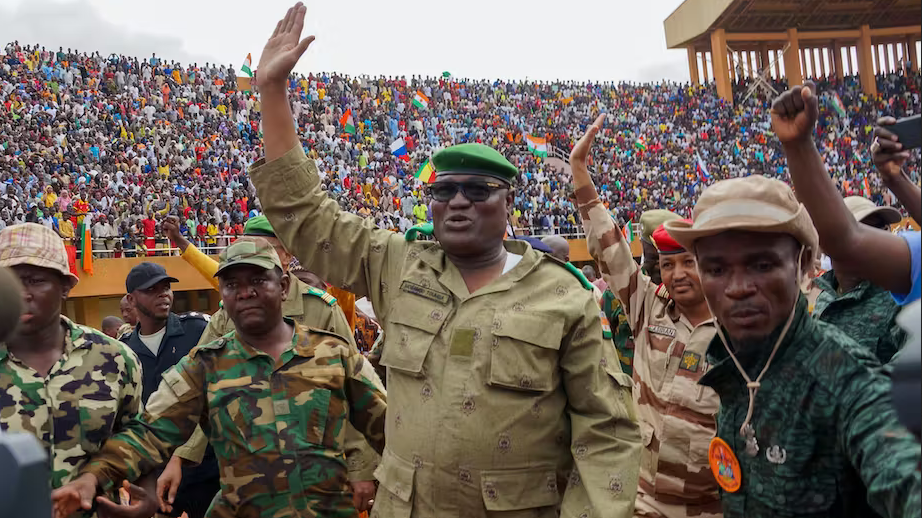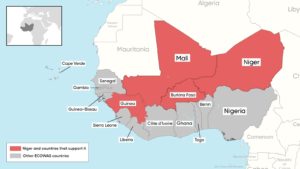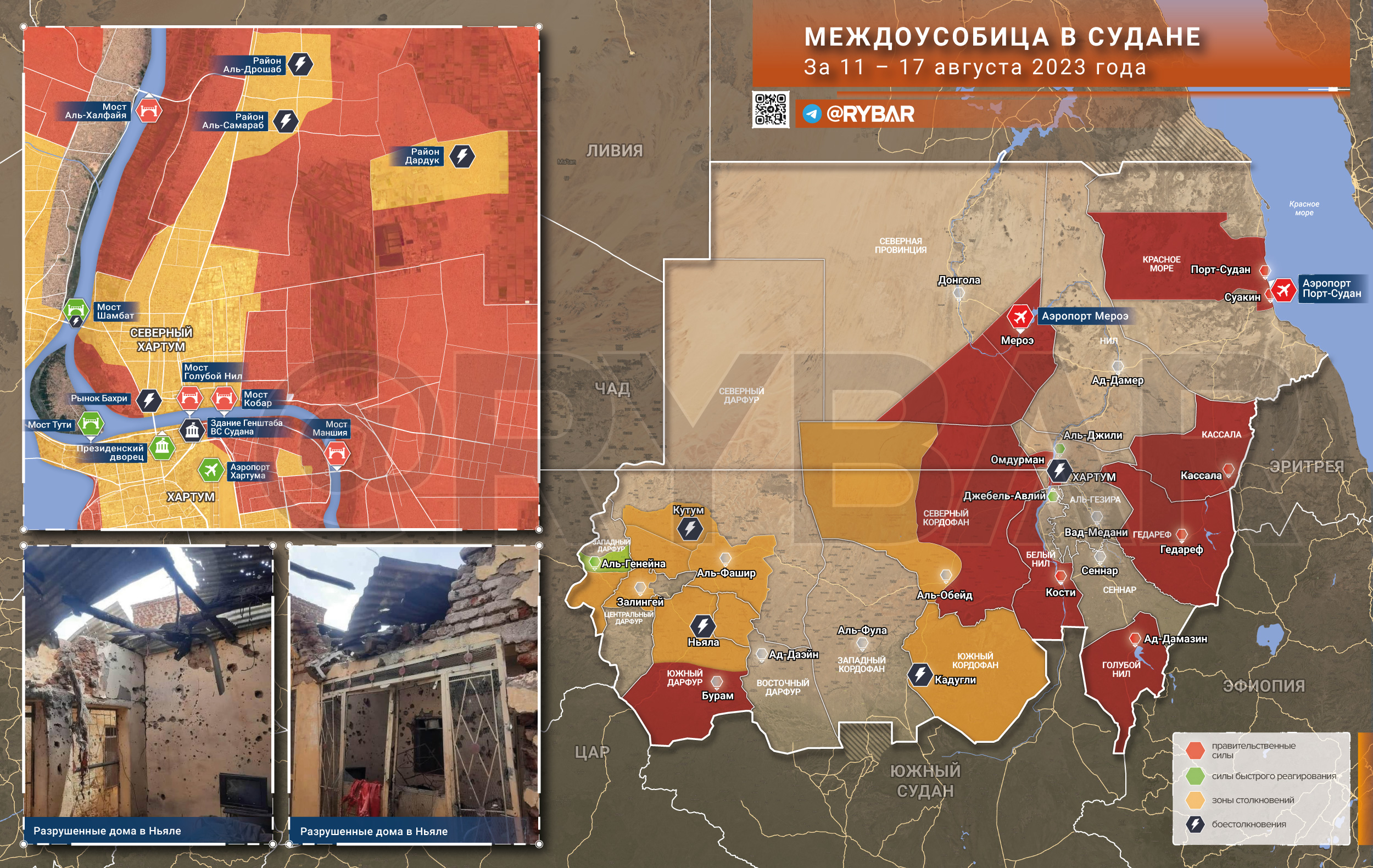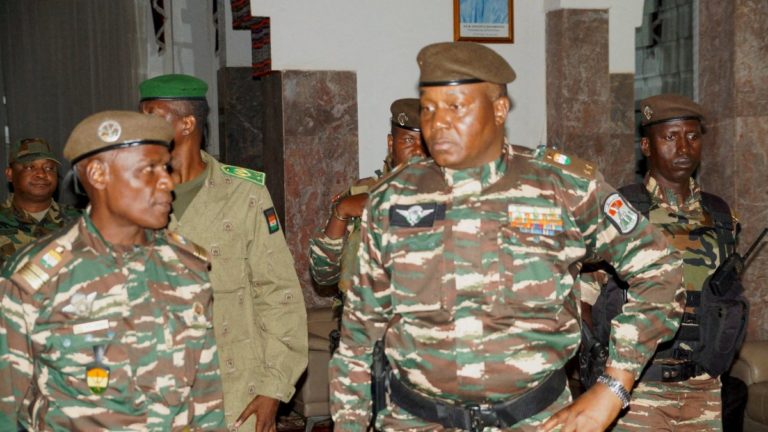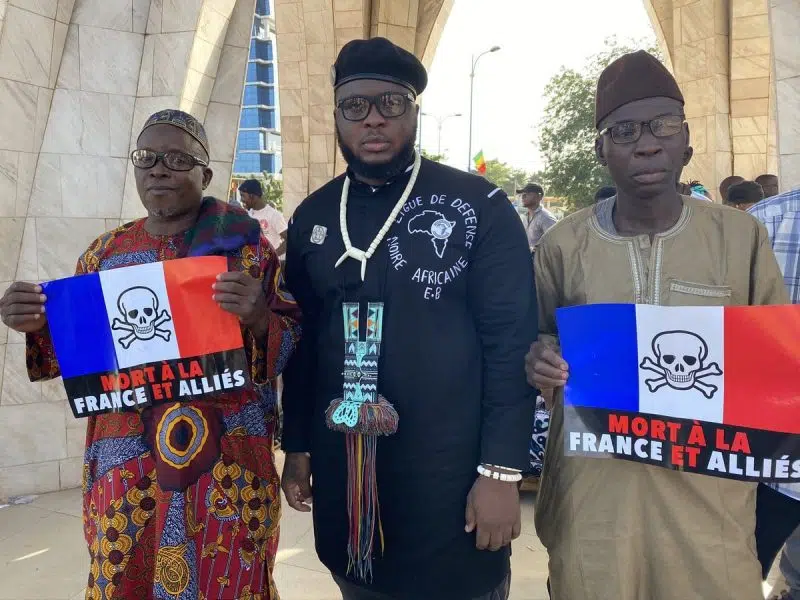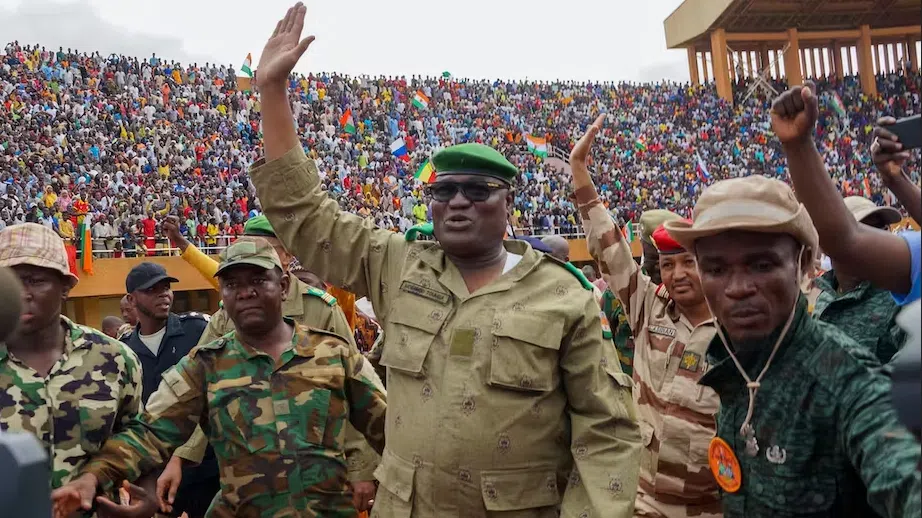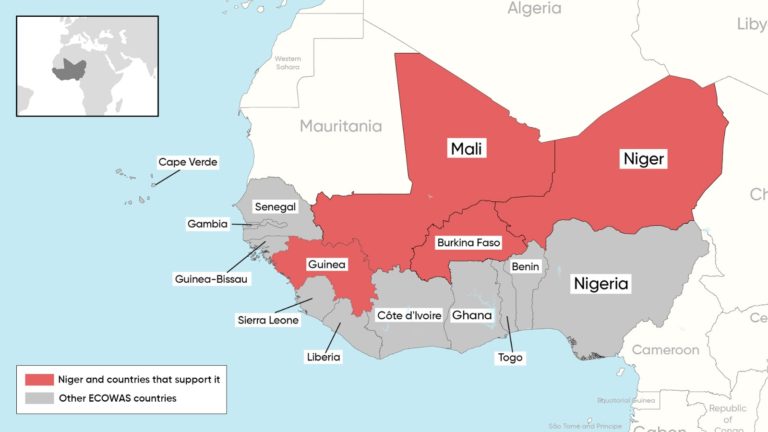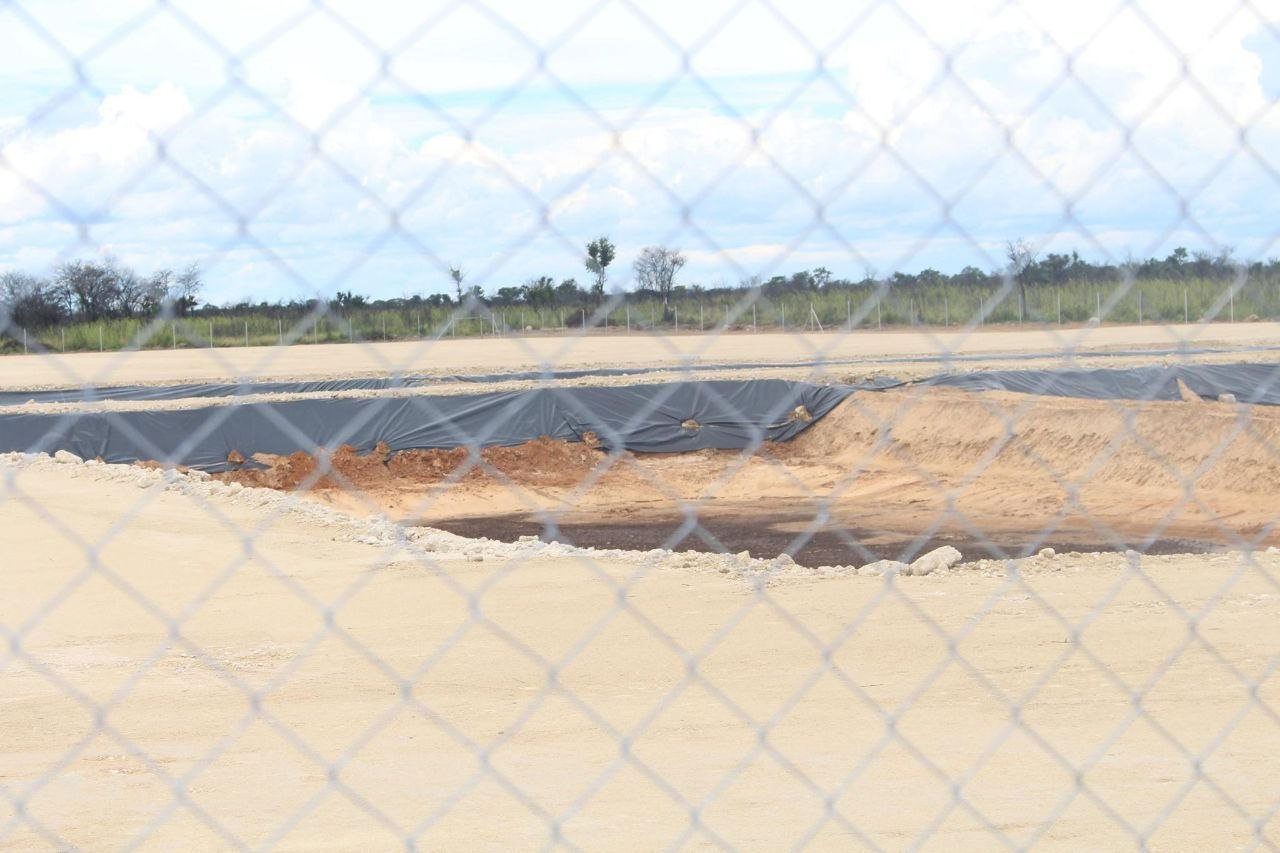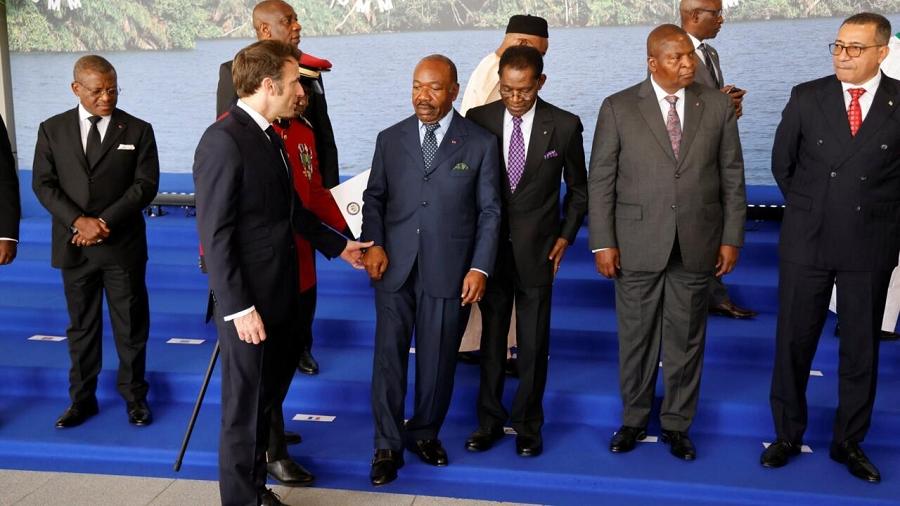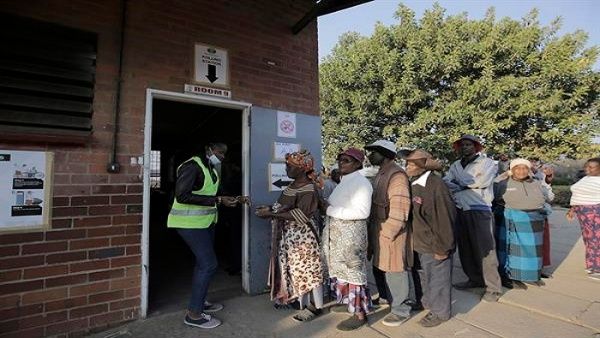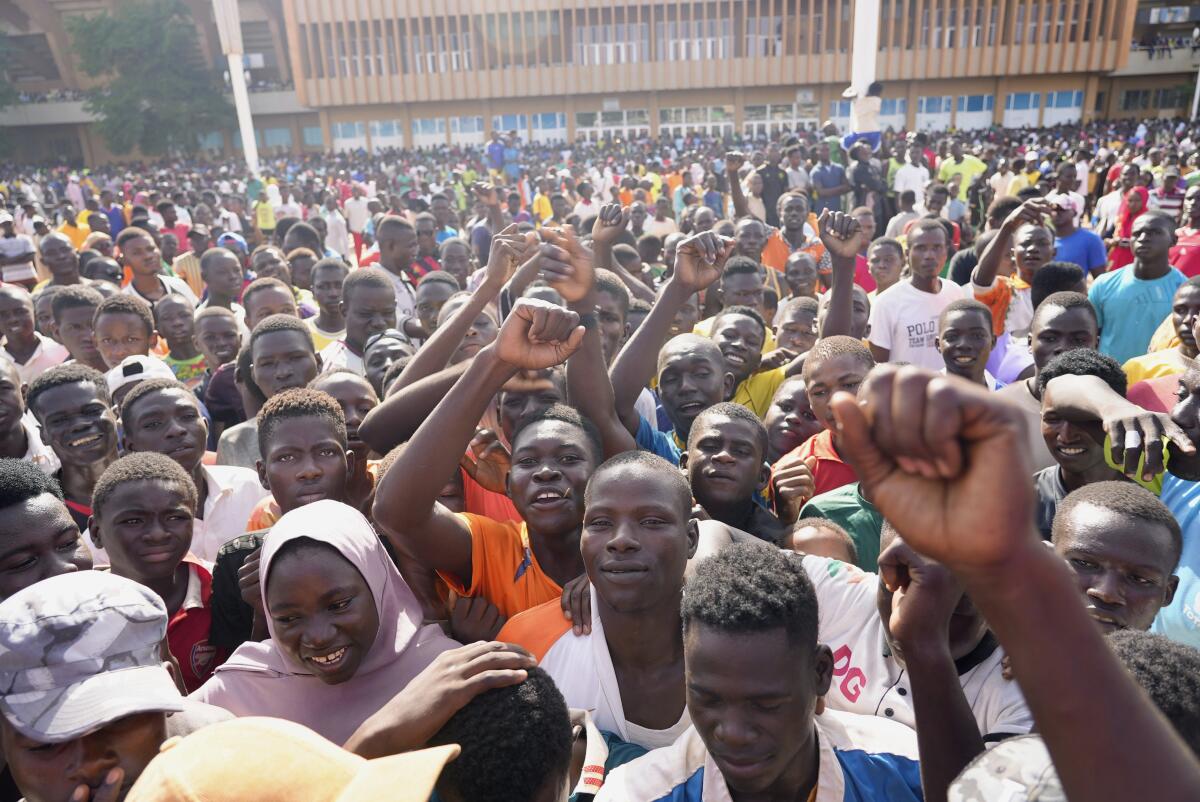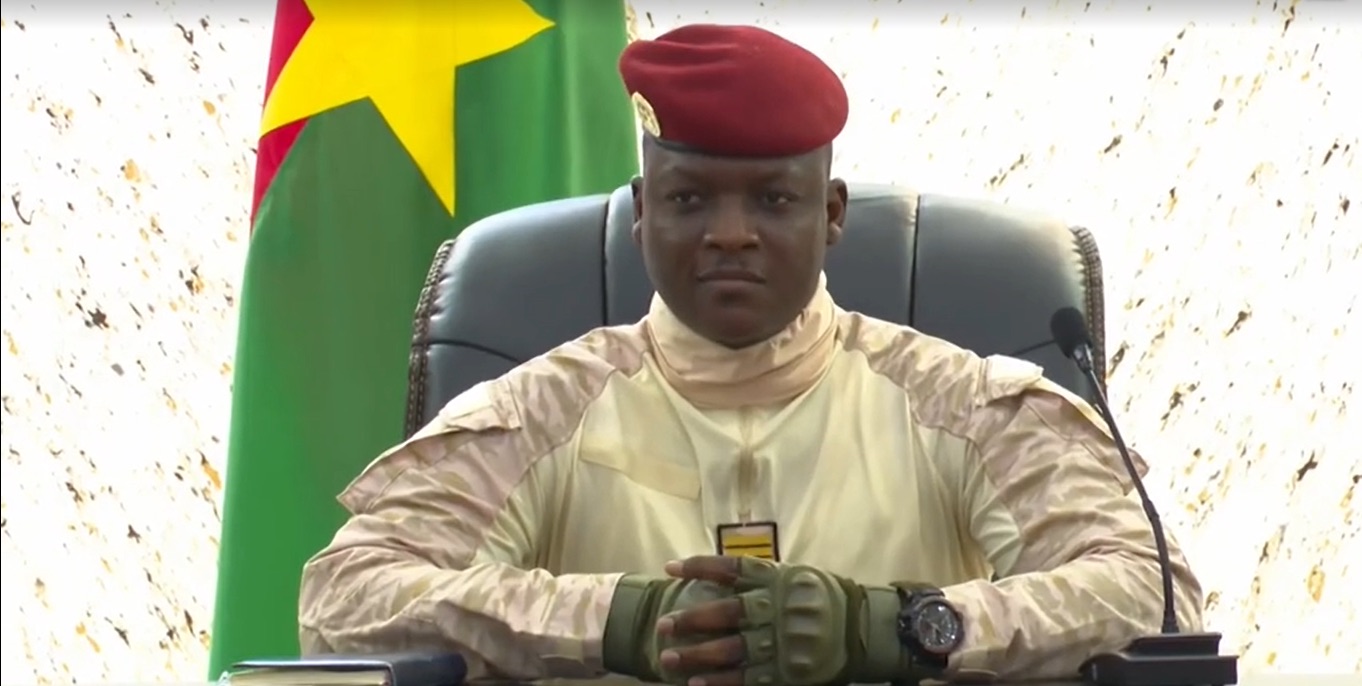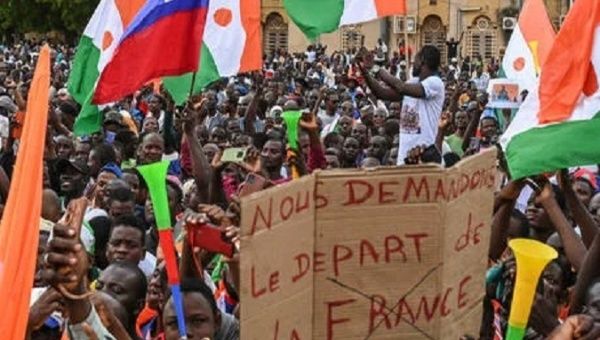August 9, 6:26 p.m

The authorities of Niger accused France of attacking the Niger military and invading the country's airspace.
France has not yet commented on the accusations of aggression against Niger.
France attacked Niger
The new authorities of Niger reported that the French military in Niger attacked the troops of the National Guard of Niger, and also violated the country's airspace (the French plane took off from N'Djamena in Chad and, ignoring Niger's air traffic controllers, landed on the territory of the country. It is now international law. Also, the authorities of Niger accused France of releasing 16 jihadists who are planned to be used for subversive activities in Niger
US Embassy in Niamey issued a safety warning to US citizens
EU calls for increased economic pressure on Niger to weaken the military junta, as the country already lacks electricity and drugs.As befits terrorists, he is trying to threaten the civilian population of a country in which they care about "democracy" in words.
The level of combat readiness of the armed forces and power structures of Niger has been increased. The country continues to prepare to repel external aggression.
No forces of PMC "Wagner" in Niger have not yet been noted. Wagner forces are now deployed in the Central African Republic and Mali.
https://colonelcassad.livejournal.com/8556116.html
Google Translator.
*******
France never stopped looting Africa, now the tables are turning
As developments in West Africa demonstrate, the francophone countries are no longer willing to accept French neo-colonialism. With the fear factor finally removed, Africa’s quest for genuine independence is steadily coming to fruition.
Brad Pearce
AUG 8, 2023

Photo Credit: The Cradle
The 26 July coup in the West African nation of Niger, which threatens to undermine French and US military presence in the region, has shed light on the historical exploitation and continued practices of Francafrique - the term used to describe the persistent exploitation by the former French Empire in Africa.
France heavily relies on nuclear energy, with 68 percent of its power coming from nuclear plants. It obtains 19 percent of the uranium required to run these plants from Niger. Despite this significant contribution toward France's energy needs, only 14.3 percent of Nigeriens have access to a power grid, and even that is often unreliable. This stark contrast highlights the disparities and ongoing exploitation by rapine foreign powers throughout the African continent.
The Legacy of Francafrique
Francafrique has been known for its exploitative systems designed to profit from African resources, using pressure, capital, and frequently outright force to maintain control over its former empire. As a result, many African states, including Niger, continue to face poverty and underdevelopment.
Burkina Faso’s young, charismatic leader Ibrahim Traore recently spoke at the Russia-Africa summit in St. Petersburg and decried the fact that Africa is resource-rich, but its people are poor, and criticized African leaders seeking hand-outs from the west, as they perpetuate dependency and poverty. He also described what is being imposed on Africa as a form of slavery, stating:
“As far as what concerns Burkina Faso today, for more than eight years we’ve been confronted with the most barbaric, the most violent form of imperialist neo-colonialism. Slavery continues to impose itself on us. Our predecessors taught us one thing: a slave who cannot assume his own revolt does not deserve to be pitied. We do not feel sorry for ourselves, we do not ask anyone to feel sorry for us.”
France's inability to justify its presence in Africa with a coherent narrative further complicates the situation. Paris cannot openly confess its greed, feign a "civilizing mission," or admit to any responsibility due to its past crimes. This lack of purpose weakens French power on the continent, leading to violence and poverty in its wake.
West Africa's drive for further independence has left Atlanticists concerned about the opening this leaves for Eurasian powers like Russia and China to increase their influence in Africa. The west's reaction reflects a lack of respect for the sovereignty of African countries, viewing the continent merely as a theater to maintain global dominance.
Since the Ukraine war's onset in early 2022, Atlanticists have expressed alarm over the unwillingness of Global South states to support the west's anti-Russia policies, a trend further amplified by the shift to multipolarism everywhere. This weakening of western hegemony has opened a path for many nations to avidly explore their geopolitical options and diversify their economies.
A report from the Munich Security Conference held in February highlighted this very real schism with the west:
“Many countries in Africa, Asia, and Latin America have steadily lost faith in the legitimacy and fairness of an international system which has neither granted them an appropriate voice in global affairs, nor sufficiently addressed their core concerns. To many states, these failures are deeply tied to the west. They find that the western-led order has been characterized by post-colonial domination, double standards, and neglect for developing countries' concerns.”
Fleeced by the CFA Franc
The aftermath of the Second World War marked a significant shift in global power dynamics, and the victorious powers sought to establish a new world order that would maintain peace and promote economic balance.
In the context of African colonies, where colonial troops played a major role in the allied victory, the victorious powers, including France, aimed to retain economic control and benefit from their former colonies even as the world moved towards decolonization.
This included the establishment of new currency systems, with French leader Charles De Gaulle creating two currencies collectively known as the CFA Franc in 1945 for former colonies in the Western and Central zone.
As the push for political independence grew stronger in the late 1950s, France organized referendums in its African colonies to vote on accepting a constitution drafted by the French.
Guinea, led by former trade unionist Sekou Toure, opposed accepting the French constitution and voted overwhelmingly against it. In a furious response, De Gaulle’s government withdrew all French administrators from Guinea and took action to sabotage the country's infrastructure and resources. The harsh measures by Paris aimed to serve as an example of what would happen to any former French colony that resisted France's agenda.
During the Cold War, the Communist states exploited such actions by presenting themselves as liberators and allies of African countries that sought independence from European influence. This stance has led to some Africans viewing countries like Russia as more equitable partners compared to France.
Over the years, France has demonstrated a pattern of intervening militarily - over 50 times since 1960 - in African countries to secure governments that remain compliant with French economic interests, particularly related to the continued use of the CFA Franc.
The system by which the CFA Franc operates has historically been one of a fixed exchange rate where the currency has unlimited convertibility but is permanently pegged to the French currency, previously the Franc and then the Euro.
African currency under French control
This means that African countries cannot influence the value of their own currency, and the difference in value makes it so that France can buy African products artificially cheap while Africans are able to buy fewer goods with the money they exchange.
Worse yet, France had requirements to store, and thus profit from, the foreign reserves owned by its former colonies, though the requirement of holding 50 percent of their foreign exchange reserves in a French-ran bank was dropped for the western zone in 2019.
Under this scheme, African states received a nominal amount of interest, but the bank benefited from lending that capital out at higher rates and attaining massive profits off of African resources and labor. This is despite the fact that many countries in Francophone Africa are major gold exporters and thus have a multitude of options for storing wealth to back a currency in alternative central banks.
While the CFA Franc system has provided some benefits in terms of stability and preventing Zimbabwean-style hyperinflation, it has also come under scrutiny for imposing requirements on African countries that are not placed on more powerful nations. The lack of control over their own currency has hindered economic growth and made these countries vulnerable to global economic shocks.
Northern African states such as Tunisia, Algeria, and Morocco chose to leave the CFA Franc upon gaining independence and have experienced relatively higher prosperity. Similarly, Botswana's success with its own national currency demonstrates that proper management can lead to stable democracy and economic growth, even for less developed nations.
Exclusive rights and privileges
The CFA Franc system has been the geopolitical equivalent of one’s father insisting he manages their savings while leaving them out of his will. There are benefits to having a trade and currency zone, such as the current ECOWAS union that covers the Western part of the continent, but by design under the CFA Franc system, independence has been an illusion by which France has fleeced these countries.
France has been dependent on Africa for its status as a world power for more than a century. Among other privileges it has carved out for itself in post-colonial treaties, France has had the exclusive right to sell military equipment to former colonies, and enjoys the first right to any natural resources discovered. Paris makes great use of these privileges: as just one example, 36.4 percent of France’s gas is sourced from the African continent.
Moreover, a vast network of French business interests, which include major multinational companies, dominate industries such as energy, communications, and transportation in many African countries. France's government also supports French businesses in Africa in several ways, including through an enormous public company called COFACE which guarantees French exports into these underdeveloped markets.
Towards independence and self-reliance
This economic dependence has contributed to the perpetuation of a system where African states remain weak, pliant, and reliant on resource exports, primarily benefiting French companies and interests. Additionally, African states are obligated to ally with France in any major conflict, further eroding their national sovereignty.
The African continent suffers from many ailments, but perhaps the most persistent and nefarious are a lack of sovereignty and access to capital. Meanwhile, much of Europe’s prosperity has been derived from looting the Global South for centuries.
The case of Brussels, built on the wealth derived from the brutal exploitation of the Congo under Belgian King Leopold II, is a stark reminder of the deep-rooted impact of colonialism. When the monarch’s crimes against humanity were discovered, he was ultimately forced to bequeath the majority of his fortune to the Belgian state upon his death.
Not wanting to do so, he embarked on an enormous series of public works to spend his ill-gotten gains, creating modern Brussels. Now the EU and NATO meet there and audaciously give disingenuous lectures about universal human rights while surrounded by the profits of some of the most brutal cases of oppression in human history.
While military governments often face challenges in achieving their stated goals, it is evident that western-backed "civil democracies" have also struggled to significantly improve the security and well-being of the African public.
The path to solving Africa's problems lies in transformative leaders who can shrug off the legacy and remaining shackles of colonialism and enable the continent to carve out a genuine, homegrown path to independence and self-reliance.
https://new.thecradle.co/articles/franc ... re-turning
******

A Beninese soldier racks his weapon during a joint U.S.-Benin live fire exercise in preparation for SHARED ACCORD 2009’s final field training event. SHARED ACCORD is a scheduled, combined U.S.-Benin exercise designed to improve interoperability and mutual understanding of each nation’s military tactics, techniques and procedures. Humanitarian and civil affairs events run concurrent with the military training. The exercise is scheduled to conclude June 25. VIRIN: 090616-M-3107S-0401 (Photo: Lance Cpl. Jad Sleiman, USMC / Wikimedia Commons)
No to the new war in Africa, stop military intervention in Niger, lift sanctions to Burkina Faso and Niger
Originally published: Defend Democracy Press on August 5, 2023 by Pavan Kulkarni (more by Defend Democracy Press) | (Posted Aug 09, 2023)
The regional bloc, Economic Community of West African States (ECOWAS), has drawn up a plan for a military invasion of Niger to restore the ousted Mohamed Bazoum to presidency. However, in Nigeria, whose president Bola Tinubu is the current chair of ECOWAS, the Senate has refused to support the military intervention.
On Saturday, August 5, at a closed-door executive session to deliberate on Tinubu’s letter seeking the Senate’s support for “military buildup and deployment of personnel for military intervention,” “almost all senators… totally ruled out the military options,” an unnamed senator told Premium Times.
Pointing out that “our military is highly ill-equipped and not prepared to fight any war,” the Senators argued that “the Federal Government should focus on solving the Boko Haram, banditry, and ESN/IPOB menaces… instead of contemplating going to war in a foreign country.”
The war plans were prepared at a meeting of the chiefs of staff of ECOWAS member countries which ended on Friday, August 4. “All the elements that will go into any eventual intervention have been worked out here, including the resources needed, the how and when we are going to deploy the force,” said Abdel Fatau Musah, ECOWAS Commissioner for Political affairs, Peace and Security.
Earlier on July 30, ECOWAS had threatened military invasion of Niger if its military junta, the National Council for the Safeguard of the Homeland (CNSP), did not restore Bazoum as the president by Sunday, August 6. He was ousted on July 26 in a popularly-welcomed coup by Gen. Abdourahmane Tchiani, who was the head of the Presidential Guard.
France, which has up to 1,500 troops in Niger, and the U.S., with another 1,100 troops in two bases, are both backing ECOWAS. U.S. Secretary of State Antony Blinken said on Thursday, August 3, “We strongly support the very strong leadership of ECOWAS on Niger.” White House National Security Council spokesman John Kirby added that there was still “time and space” for diplomacy, but that “window is not going to be open forever.”
While the U.S. President Joe Biden said that the “Nigerien people have the right to choose their leaders,” the “Nigerien people,” who perceive Bazoum as a corrupt puppet of France, have repeatedly mobilized in tens of thousands to support the coup.
A coalition of 14 trade union centers called the Unité d’Actions Syndicales du Niger (UAS-Niger), which had been demanding the withdrawal of French troops, has supported the coup and called on Nigeriens to rally behind the CNSP.
As Nigeriens celebrated the anniversary of its independence from France on August 3, the CNSP terminated five military agreements signed with France between 1977 and 2020, allowing the former colonizer to station up to 1,500 troops in the country.
Donning T-shirts with coup leader Tchiani’s image, thousands took to the streets once again that day, sloganeering “Down with France,” and demanding the withdrawal of its troops and other foreign forces, including those of Italy which has 300 soldiers and the European Union (EU) which has a smaller contingent.
The mass-demonstration was organized by the anti-imperialist M62 Movement, formed last year as a coalition of 15 civil society organizations which have been protesting against French deployment in the country for at least two years. One demonstrator said,
It is only security that interests us..[whether it is provided by] Russia, China, Turkey…We just don’t want the French who have been looting us since 1960.
France, however, has refused to withdraw its troops, with its foreign ministry’s spokesperson Anne-Clair Legendre saying,
We don’t answer to the putschists. We recognize one constitutional order only, that of President Bazoum.
Under detention by the army, Bazoum, who had instituted a crackdown on the anti-French movement in the country, wrote a column in the Washington Post on independence day, calling for U.S. intervention to restore his power. A U.S. warplane C-17A–which is “is capable of rapid strategic delivery of troops and all types of cargo to main operating bases or directly to forward bases in the deployment area”–arrived in Benin shortly after its government declared support to the military intervention.
In the meantime, as a part of ECOWAS sanctions, Nigeria has stopped electricity supply to Niger. While Niger’s high-grade uranium is used to power a third of the light bulbs in France, its own electrification rate is less than 18%. Up to 90% of its power is imported from Nigeria.
Difficult times
“The weeks and months to come will certainly be difficult for our country. Those who oppose us have no limits when it comes to defending their selfish interests. They will only stop in the face of the firm determination of the Nigerien people,” Tchiani said.
Suspending Niger’s diplomatic ties with France, the U.S., Nigeria, and Togo, also an ECOWAS country, Tchiani warned that “any aggression or attempted aggression against the State of Niger will see an immediate and unannounced response from the Niger Defense and Security Forces.”
Mali, Burkina Faso and Guinea–three other suspended members of ECOWAS, sanctioned after similar popularly-supported coups–have expressed support to Niger. Together, they make up nearly 60% of the total land-area of ECOWAS countries. Mali and Burkina Faso, whose military juntas ordered the French troops out of their countries after taking power, have said they will mobilize their forces in defense of Niger if it is attacked.
The Vice-President of the CNSP, Lt. Gen. Salifou Mody, traveled to Mali and met its president, Colonel Assimi Goita. He also held a meeting with “someone from Wagner” while in Mali, AP reported. Mody also met with Burkina Faso’s leader, Captain Ibrahim Traore, and spoke about ECOWAS.
“We spoke precisely about this situation because we would not like Niger to become the new Libya,” Mody said, adding that they have decided to “undertake a number of activities to be able to deal with the situation.”
Ivory Coast, Benin, and Senegal have pledged to send troops for the ECOWAS invasion. Chad, whose president also took power in a coup but remained in the West’s good books, not having demanded the withdrawal of French troops, has refused to take part in the military intervention.
While supporting the call for restoration of Bazoum, Niger’s northern neighbor Algeria, has opposed “foreign military intervention,” which it said will “only complicate and exacerbate the current crisis.” Russia had also called for the restoration of constitutional order, but opposed military intervention.
Peoples’ movements across West Africa and other parts of the continent have opposed military intervention, and called for the withdrawal of all foreign bases in Niger and other countries of the region.
In a statement on August 4, the Workers Democratic Way party in Morocco expressed its “strong rejection and condemnation of the imperialist threats, especially from the French, of direct military intervention or through its puppet regimes in the region against Niger,” adding that “a war could ignite the entire region, leaving behind destruction, loss of lives, and horrific tragedies.” The Party further affirmed “the right of the Nigerien people to self-determination away from foreign interference.”
The Communist Party of Kenya condemned foreign military bases in Africa, which serve “as instruments of imperialistic control.” The party added that the “presence of these military bases deepens historical wounds of colonization and reinforces the oppressive grip of foreign powers. We call for the immediate dismantling of all foreign military bases in Africa to protect our dignity and freedom.”
https://mronline.org/2023/08/09/no-to-t ... and-niger/
******
Socialist Party of Zambia condemns arrest of Dr. Fred M’membe
Dr. Fred M’membe was arrested on charges of libel on August 8, after he was summoned for questioning by the Zambian police. An outspoken critic of imperialist and neoliberal policies, M’membe had long warned of his arrest amid attacks on the Socialist Party
August 08, 2023 by Tanupriya Singh
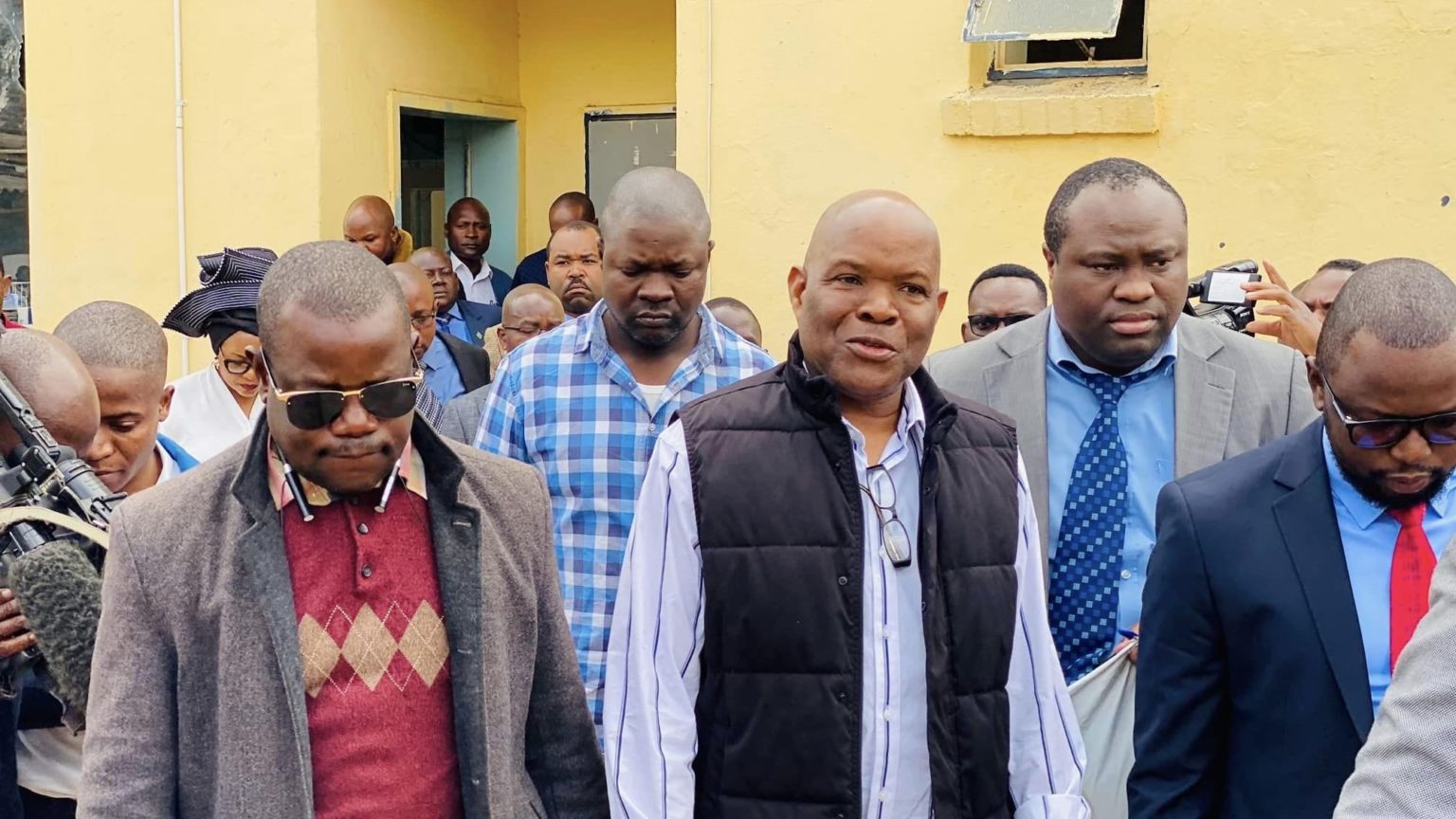
SP President Fred M’membe (Center) was arrested by Zambian police on charges of libel on August 8. Photo: Socialist Party of Zambia
The president of the Socialist Party (SP) of Zambia, Dr. Fred M’membe was arrested by police on August 8. The leader and veteran journalist was charged with the offense of libel, after he was summoned for questioning at the Woodlands Police Station in Lusaka on Tuesday.
As M’membe arrived at the police station, members of the SP and supporters gathered in the area in solidarity, carrying the banner of the Student Socialist Movement, the flags of the SP, and placards with slogans that read “Hands Off Our President!”
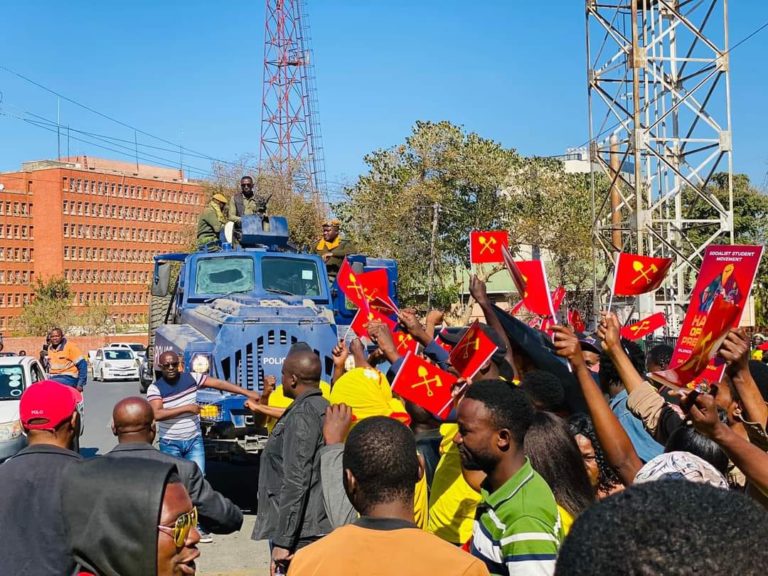
Members of the SP gather to denounce police actions against president Fred M’membe. Photo via Facebook
In a statement on August 6, the Socialist Party students movement’s chairperson, Joseph Musonda said, “We are angry at the manner [in which] the state has been treating our President [M’membe]. Even if you are not a socialist, you can see the injustice that has been done against our President. Just recently you saw the political violence in Mkushi, Serenje, Chitimukulu, Mwansabombwe, Luapula province[s]… The SP President has always complained to the relevant authorities. But he has been treated as the instigator.”
Among these instances of violence was that of Serenje, where in April, members of the SP were violently attacked by alleged cadres of the ruling United Party for National Development (UPND). While the attackers remained at large, the Zambian police arrested M’membe on charges related to the discharge of a firearm and assault.
Following the proceedings at the Woodlands Police Station on August 8, a statement by a police spokesperson announced that M’membe had been charged with libel in relation to an article that was published and circulated on social media on June 6 with the alleged “intent to defame” the Deputy Inspector General of Police. Police have also issued a “warn and caution statement” to M’membe regarding an alleged “offense of communication of certain information” contrary to Zambian law.
Speaking to the media, M’membe’s lawyer Simon Mulenga Mwila stated that M’membe had denied the allegations and that he “remained in high spirits”. As he was being escorted away, M’membe said “We are being locked up, it is not the first time it has been done and it will not be the last, but it has never taken anybody anywhere…”
SP spokesperson Frank Bwalya later notified that the “police had managed to frustrate efforts to get [a] police bond” for M’membe, “their plan to make him sleep in the cells [in the police station] has worked.” The SP president remained in detention at the Woodlands Police Station as of the evening of August 8, where he has since been visited by members of Zambian political parties including the former ruling Patriotic Front (PF) and the National Democratic Congress (NDC).
M’membe had been warning of the threat of his arrest for weeks, stating back in June that the SP had received “reliable information” that the police, “in collaboration with UPND cadres drafted into the State House security” intended to “abduct him”, further accusing President Hakainde Hichilema and the Deputy Inspector General of Police of the State House of engaging in a “gestapo style of policing.”
In a statement to the media on August 8, the Inspector General of Police, Graphel Musamba, said, “We have noted with serious concern the utterances recently made by Socialist Party leader Dr. Fred M’membe. The statements published in some tabloids and various social media platforms are inclined at nothing but inciting the peace loving people of Zambia so that they lapse into civil disobedience in order for them to gain scarce political mileage.”
Musamba went on to threaten that “the Zambia Police Service has an obligation to defend the constitution at any cost and that it will do, even if it takes some stern measures such as smashing the rebellion which we know is carefully being instigated by [the] Socialist Party… As a reminder to the Socialist Party, if you check the history of this country, people with frivolous dreams such as yours have been defeated.”
Calling it an “outrightly political statement,” M’membe responded to the Inspector General’s comments on his Facebook page— “The Zambian people already know the suffering they are facing under Mr. Hichilema’s one-term regime. Let Mr. Hichilema know that the Zambian people don’t need anyone to incite them; they are fully awake to the suffering he has put them through so far.”
“What is likely to incite Zambians is the hunger and untold suffering they are being subjected to as their President continues to work very hard to serve imperialists and transnational corporations. What has caused Zambians to lose faith and confidence in Mr. Hichilema and his far-right UPND government are the gross inequalities and injustices that Mr. Hichilema is reinforcing and then commanding his Inspector General of Police to defend.”
“Zambia needs a conscious leadership that understands our non-aligned strategy to our foreign policy. The clientist role played by the UPND government is crippling,” M’membe had said in a tweet in July.
The SP has consistently denounced Western imperialism and neoliberal policies. In Zambia, it has criticized the lack of government response to the worsening cost of living crisis, exemplified by the rising prices and shortages of mealie meal (a type of maize flour), fuel, and electricity.
In an article published on July 29, M’membe denounced the UPND administration’s two years in office as being “disastrous,” marked by the arrest of opponents and “selective justice,” and by the government being a “puppet of Western governments by allowing an AFRICOM “office” in Lusaka, while backtracking on its promises.
In his statement on August 8, M’membe added further, “The problems this regime finds itself with today emanate from its own lies, deception, or simply put, unfulfilled promises and shameless puppetry by a President and regime eager to serve Western and transnational corporation interests at the expense of its own people, many of whom can now only dream of half a meal a day.”
https://peoplesdispatch.org/2023/08/08/ ... ed-mmembe/
*******

NIGER: AFTERMATH OF THE FALL OF GADDAFI IN THE AFRICAN SAHEL
9 Aug 2023 , 12:39 pm .
Niger is one of the countries located in the Sahel region, perhaps the most historically exploited area in the world. It is the southern fringe of the Sahara, which divides the Maghreb from sub-Saharan Africa. In Arabic it means " limit " . It concentrates a huge amount of strategic resources that have been overexploited for centuries, a catalog of destabilizations and chaos due to the rise of foreign military interventions, coups d'état and terrorism in recent decades and, therefore, the cradle of several of the greatest leaders anti-colonial and pan-African of the 20th century.
The Sahel is a territorial band with a length of 5,400 kilometers that joins the Atlantic coast of Mauritania and Senegal with the Red Sea on the shores of Sudan and Eritrea; in the middle, from east to west, are Ethiopia, Chad, Niger, northern Nigeria, Mali and Burkina Faso.
The international slave trade originated in its western segment in the 16th century: the triangular trade — well describedby the Trinidadian politician and historian Eric Williams-, based on the export of junk products from Europe to the Sahel, where they were exchanged for African slaves to be transferred to America, where they arrived to produce and extract the goods that were later marketed in the European markets. The mercantile system, from which modern capitalism emerged, would not have existed without West Africans becoming the main human commodity in this triangulation. The Sahel was also the scene of trans-Saharan activity, where different routes connected to all African latitudes, and which lasted longer than the triangular one.
After the Berlin Conference (1884-85), in which Spain, Italy, France, the United Kingdom, Germany, Portugal and Belgium arbitrarily divided and divided the entire continent as colonies, with the exception of Ethiopia —formerly called Abyssinia— and Liberia , the role of Africa as a source of raw materials and slave labor in the international division of labor deepened, and with it the history of rebellions, revolutions, putschs, assassinations, secession and liberation movements in response to, and in line with, the colonial barbarism lived for centuries.

France managed to keep much of the Sahel, and has enjoyed the mining, energy, natural and human resources of the region, making up French West Africa (AOF) . Among its possessions were Mauritania, Senegal, French Sudan (present-day Mali), French Guinea (present-day Guinea-Conakry), Ivory Coast, Upper Volta (present-day Burkina Faso), Dahomey (present-day Benin) and Niger.
The colonial benefit was marked by the diversity of natural resources, the spaces of trans-Saharan commercial transit —not only the transatlantic slave route but also the trans-Saharan one) and the deposits of minerals, oil and gas. To the south of the strip, in the area of the great lakes, there is also one of the largest water reserves in the world, as well as iron, salt, diamond, copper, coal and uranium. The interests of French capital around the Sahel gave geopolitical and geostrategic importance to the region; the mandate over Algeria, Madagascar, Tunisia, Togo and part of Morocco, Cameroon and present-day Chad, the Central African Republic, Congo and Gabon —together it was called French Equatorial Africa— granted a profit margin that, after the African independence processes ,
Starting in the 1960s, liberation movements began in the Sahel, after the start of the Algerian war in 1954. That year, France ended up losing its 14 colonies . It was a moment when expressions and leaderships in favor of national sovereignty sprouted from all African countries, the dawn of pan-Africanism with the Ghanaian Kwame Nkrumah as its main spokesperson and articulator. Modibo Keïta, former president of Mali (1960-1968), and Thomas Sankara, in Upper Volta, were born in the French colonies, who led a political revolution that led to the renaming of the country —and the national project— as Burkina Faso, which they represent today the ideals and sentiments of African liberation and independence.
The rise of these political figures and processes were marked by the geopolitical beacon of the Bandung Conference in 1955, which gave birth to the Non-Aligned Movement (NAM), of which Nkrumah, representing Ghana and in favor of directing African wills towards a common destiny, helped organize and was one of its most important promoters. The struggles in Asia also share the same context of the fate of Africa during the 1950s, 1960s and 1970s: some were references to others.

Subsequently, after a series of US and European operations to depose and undermine anti-colonial and pro-independence leaderships in Africa, install governments in favor of North American and European foreign policy and capital, insert themselves into African socio-economic dynamics and loot the continent's resources. Through neocolonial practices, the present in the Sahel is dominated by the geopolitical and geostrategic agenda of different global powers.
To provide just one example of the colonial relationship, now quite viral for the demonstrative: Niger's uranium produces 40% of France's electricity through nuclear power, while 89% of the Nigerien population has no electricity service. In 2014 , one in three light bulbs in France worked with uranium from that source. This country is the sixth largest world producer of the aforementioned mineral; It is mined near the twin mining towns of Arlit and Akokan, 900 kilometers northeast of the capital Niamey, on the southern border of the Sahara desert and in the western range of the Aïr Mountains.
The asymmetry in the correlation between France and Niger is a characteristic of neocolonial dynamics: development for them, anti-development and overexploitation for those.
This reason is the fundamental engine of the latest political and geopolitical events that the countries of the Sahel have carried out, a strip where the rate of coups d'état has risen: since 2020 six countries have had forced changes of government, where military juntas have been established and transitional administrations with anti-colonial and pan-African visions and leaders with experience in the fight against terrorism, the other nodal factor inserted in the brokering of interests surrounding the situation in Niger and other neighboring countries that support the CNSP.
According to the latest Global Terrorism Index report from the Institute for Economics and Peace:
" The Sahel is the region of the world most affected by terrorism, registering a notable deterioration in 2022 despite improvements in Nigeria and Niger. Both Burkina Faso and Mali saw substantial increases in deaths from terrorism with an increase of 50 % and 56%, or 1,135 and 944 deaths, respectively.In addition, four of the ten Sahelian countries are among the ten worst scores in the Global Terrorism Index (GTI).Neighboring Sahelian states also experienced an increase in terrorist activity in 2022, and Benin and Togo counted more than ten deaths for the first time " (p. 13).
Specifically, jihadist terrorism has a particular role in this scenario and, therefore, it is connected to the political and geopolitical factors in dispute. The destruction it has left in its wake has grown, and it has a solid foundation for history.
THE LIBYAN ORIGIN: THE POST-GADDAFI ERA
With the fall —and martyrdom— of Colonel Muammar al-Gaddafi in 2011, two tectonic movements of international scope occurred, of special historical significance for the Sahel: 1) the end of the Libya-European Union migration agreement; and 2) the mobilization of the groups that were in the coup against Libya to their countries of origin —with Azawad, the Tuareg region where Timbuktu is located, in the north of Mali, one of the epicenters—, which gave rise to a network of networks of organizations affiliated with jihadist terrorism along the route of the strip.
Following the intervention of the North Atlantic Treaty Organization (NATO) in Libya, there has been a situation of fragmented governance, in a context of erosion of state authority, a country turned into a slave market and smuggling of weapons, drugs and resources strategic open-air operations, in which Niger has become one of the main crossing points for trafficking networks, located at one of the vertices of the Mediterranean Sea, with routes to Italy and the island of Lampedusa off the coast, and to the within all regions of the African continent.
The post-Gaddafi Libyan security and stability crisis produced a loss of border control that de facto broke the agreement between Libya and the EU —through Italy— launched on October 5, 2010 . Supposedly 5 billion euros were invested to stop the " unpleasant " migratory flow, with successful results as a result of a collaboration that was cut short in 2011 and began the era of widespread jihadist terrorism in many parts of Africa, but which also succeeded in sneak in and settle in the main countries where the elite of European capital reside, including the United Kingdom, Germany and France. The effects of jihadist migration to Europe have been more than palpable over the last decade.
At present, the Europeans —with Italy at the helm, a former metropolis— continue to debate which is the best project to stop illegal migration from Libya, while the country continues to experience the consequences of the NATO intervention at the Mediterranean entrance to Africa.
Inland, one of the routes of illegal trade and terrorism crosses the different national territories of the Sahel, through which Niger appears as an obligatory step on the way to Mali, Burkina Faso and Nigeria, from south to north. Within that area, new branches of jihadist terrorism emerged after Al-Qaeda's involvement bore its fruits of destruction and chaos in 2011. Al-Qaeda's operations in Libya officially began in 2007, as announced by one of its leaders, Ayman al-Zawahiri, at the time. Libyan rebel commander Abdel-Hakim al-Hasidi admittedthat its fighters had ties to al Qaeda. The jihadists who fought in Iraq were on the front lines of the battle against the Gaddafi government, just as they were in Afghanistan in the 1980s and the Algerian civil war in the 1990s; many of them were also in the Sahara and the Sahel.
The armed conflicts provoked by terrorist groups throughout the strip have opened up larger markets for the smuggling and trafficking of arms, drugs, slaves and raw materials, and have facilitated the rise of the illicit economy around the energy and mineral enclaves of the area, while mass displacement increased and a trail of chaotic destruction occurred in its wake.
Facts and investigations confirm that Al-Qaeda and Daesh (Islamic State) currently have branches and cells in the Sahel, called respectively Jama'at Nusrat al-Islam wal-Muslimin (JNIM) and Islamic State in the Greater Sahara (ISGS). , where they have committed war crimes and crimes against humanity. Extremist organizations such as Ansar Al-Din (Mali) and Boko Haram (Nigeria), also directly and indirectly related to the aforementioned, have taken advantage of the circumstances to expand their activities, turning the region into the epicenter of African jihadism, and have expanded the government instability and, therefore, the security crisis in the Sahel, as indicated by the aforementioned Global Terrorism Index in its 2023 edition.

The situation in Burkina Faso and Mali was critical in terms of security , with daily massacres and atrocious crimes on public roads against civilians, under the consolidation of the operations of jihadist groups in the central Sahel , with a tendency to expand in Togo, Benin , Ghana and Ivory Coast. The germ of terror grew in the bowels of the Sahel, and the combat of the state armies against its forces has generated a chain reaction on the part of the military commanders responsible for neutralizing and defeating the enemy.
Currently, President Ibrahim Traoré, captain of the Burkinabe army, rules in Burkina Faso, a personality who has supported Niger from the first minute of the coup against the surrounding foreign powers. He came to power on October 6, 2022 after the overthrow of Paul-Henri Sandaogo Damiba. In his speech to the Russia-Africa Summit in late July, he referred to the Slavic federation as " family " and accused other African presidents of " puppets of imperialism . "
Colonel Assimi Goita seized power after two coups in 2021 in Mali. The criminal violence, of a jihadist nature, adds to the territorial conflict, calmed but unresolved, of the Tuareg rebellion at the beginning of the 2010s. The response to the complex scenario was the transition government led by Goita, who is negatively propagandized as "Putin's strongman in Africa" because of his anti-colonial animosity towards the United States and France.
Following the same path, and returning to the Niger case: General Tchiani was criticizing for months the security policy of the Bazoum administration in the fight against terrorist jihadism, since the French troops in Niger multiplied without leaving any positive effect, except for the give security to the European companies that exploit Nigerien uranium and gold.
The relocation of the French forces of the anti-terrorist operation "Barkhane" —following the disaster of Operation Serval in 2013 — after their departure from Mali to Niger as a result of the failure of their objectives, and by sovereign order of the Malian government to expel the troops foreign, filled the camel's back and General Tchiani along with other senior officers of the Nigerien military corps took the measure of the coup in a country submerged in the tyranny of hunger, violence and neocolonial dependency.
Tchiani recounts : "We often tracked down the terrorists, but when we asked that we rush to kill them, former President Bazoum told us to first ask the French forces for permission. Our soldiers were falling on the fronts and France did nothing."
From this statement it can be deduced, with a minimal analysis of the facts, and keeping in mind the historical thread of the current scenario in West Africa, that the putschs in the western fringe of the Sahel are the response of the military commanders of Burkina Faso, Mali, Guinea , and now Niger, to a combination of increased jihadist terrorist activities, the debacle of French military and European initiatives in general, and the historical misery of its peoples: the cumulative effects of the post-Gaddafi era on the region.
And, on the other hand, the discourse of the Sahelian officials is in tune with the old pan-African spirit of the mid-twentieth century —the position of Burkina Faso stands out, more inclined towards the pan-African proposal over the other governments, currently more attached to the pragmatic one in terms of international alliances—, but updated to the context of contemporary disputes in the geopolitical and geoeconomic terrain in Africa, where the United States, China and Russia play a leading role.
https://misionverdad.com/globalistan/ni ... l-africano
Google Translator
******
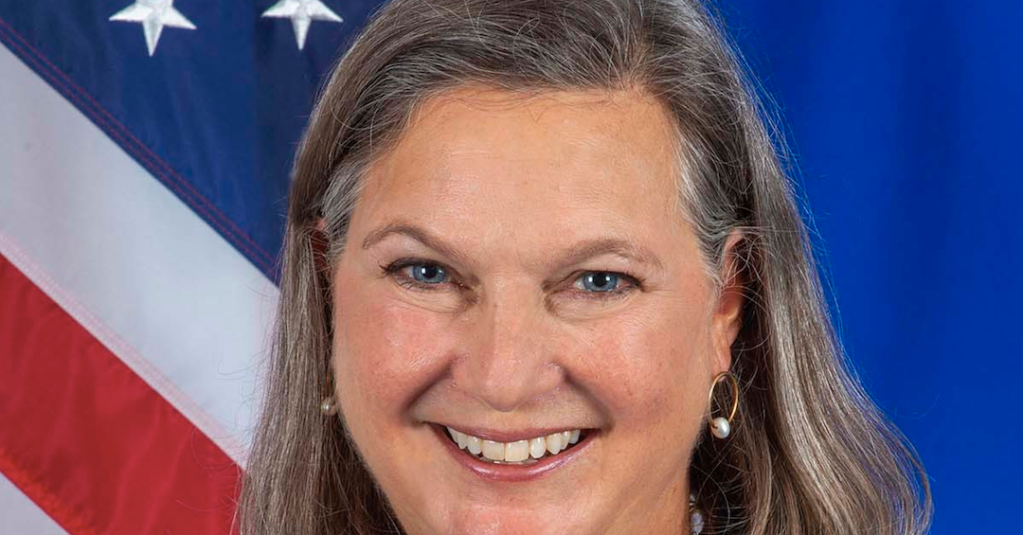
Victoria Nuland Has Gone To Africa
Victoria Nuland has gone to Africa. Gone to Africa to talk some sense into the Nigeriens and convince them to return to the shackles of Paris. Gone to Africa to harvest blood diamonds and cobalt. Gone to Africa to masturbate on Gaddafi’s grave. Gone to Africa to trade glass beads for slaves.
Caitlin Johnstone
August 9, 2023
Victoria Nuland has gone to Africa.
Gone to Africa to talk some sense into the Nigeriens
and convince them to return to the shackles of Paris.
Gone to Africa to harvest blood diamonds and cobalt.
Gone to Africa to masturbate on Gaddafi’s grave.
Gone to Africa to trade glass beads for slaves.
Victoria Nuland has gone to Africa
to help the bank boys keep their dicks in the mother continent,
to help keep the siphon tubes stuck into the mother continent,
to help keep the Russians and Chinese out of the mother continent.
Traveling around the mother continent in the mask of a medieval plague doctor,
collecting the fat leeches and replacing them with new ones.
The AFRICOM emblem looks like a vagina,
and Victoria Nuland looks like an involuntary pelvic exam.
She makes me feel like a lost kid in a cornfield at dusk.
She has mushroom clouds in her eyes.
Soon Victoria will leave Africa and go home,
back to the land where corporations are people and flags are gods,
where the presidents have dementia and the poor have college degrees,
where alienation flows like water and bullet casings fall like rain,
where people wear airpods to mute the screams of their hearts and the homeless,
where the middle class talk only to their Uber drivers and strangers they’ve mistaken for their Uber drivers,
where soldiers march for fascism while flying rainbow flags,
where war is a lucrative industry and journalism is a crime.
She’ll come home to a house that no millennial will ever be able to afford,
into the loving embrace of her blood-spattered husband.
They will make freakish, horrifying love that night,
and she will fall asleep and dream of passing out cookies
while the world turns to fire.
I had a dream, too.
One of the strange ones that always come true.
A pentagon was smashed to pieces by a giant black fist.
I don’t know what it means
or what future it portends,
but I do know Victoria Nuland
wasn’t passing out any damn cookies.
https://caitlinjohnstone.com.au/2023/08 ... to-africa/
